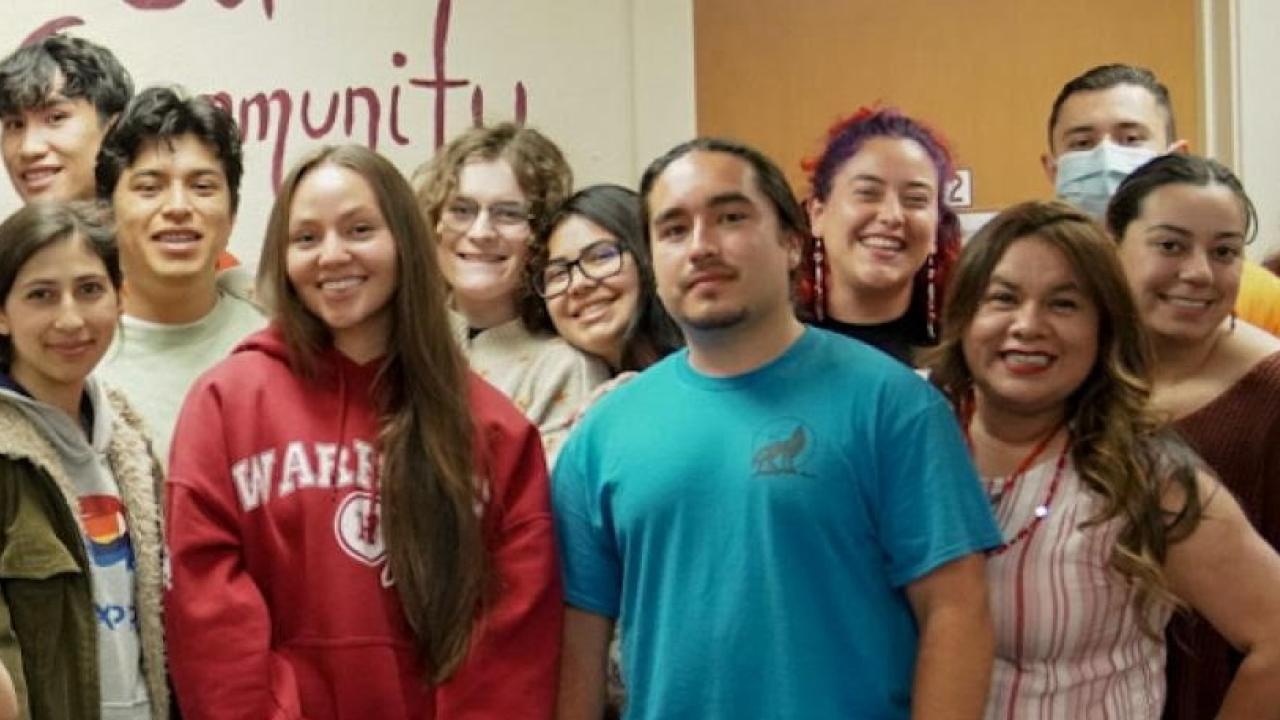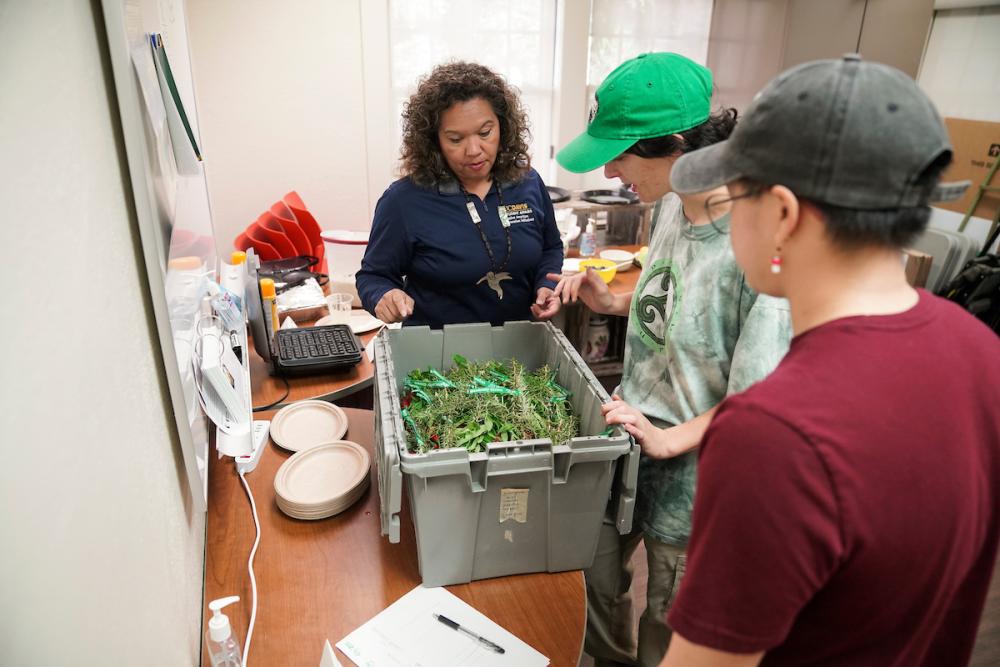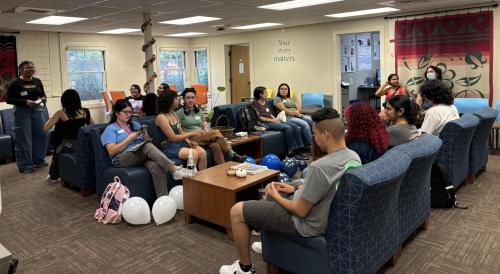
Spotlight of the Month: The Strategic Native American Retention Initiative
For the November newsletter, the Division of Diversity, Equity and Inclusion had the opportunity to interview the Strategic Native American Retention Initiative (NARI) as the spotlight of the month.
The interview featured Michelle Villegas-Frazier, director of NARI, the Native American Academic Student Success Center (NAASSC) and the Native American, Alaskan Native and First Nations Affairs; William Sampson, associate director; Nora Zade, program coordinator; and Jean Murata, office coordinator.
The conversation highlighted various topics related to the community, such as initiatives, needs and opportunities to elevate and support Native and Indigenous students at UC Davis.
Q: When students come to the Native American Academic Student Success Center (NAASSC), what do you hope they will experience?
Michelle: I hope when students enter this space, it will feel like a “home away from home” for them. The NAASSC/Nest is one space for Native and Indigenous students, but there are others on campus like Native American Studies and the Gorman Museum, which are also dedicated to the community and offer a range of resources and a sense of belonging.

William: I believe the center is very critical to student retention, specifically Native student retention at UC Davis. We have students who are coming from smaller communities and are now in a large campus setting, which can be a lot. We try our best to support academic retention and Native students. But academic doesn't just mean what happens in the classroom. We partner with drop-in advising at the Career Center and the Academic Assistance and Tutoring Centers on campus. We’re also doing holistic retention, basic needs advising and support, and directing students to different campus partners and organizations like the Pantry through the Aggie Compass and the Student Farm.
Jean: We also help students use their experience in this big university to navigate everyday experiences as People of Color and Native Americans and deal with certain things that happen like microaggressions. We’re not just focused on graduation, we are also invested in their career advancement, leadership training and helping them figure out what they want to do and why and helping them navigate those resources.
Q: What are ways in which students can raise concerns and have meaningful discussions around Native American issues?
Michelle: So, there are a couple of different methods that we use. One is the Native American Indigenous Advisory to Chancellor May, which is a student-led committee that has the pulse of the community – both undergraduate and graduate students and professional students – on what are some of the hot topics and issues that need to be addressed to the chancellor and administration.
William: Outlets that we utilize to get feedback from students are in-house. We solicit feedback for events and programming from students through different surveys. We also have six student scholar staff that we employ here at the center. They’re the first point of contact for anyone who comes to the center, regardless of if you're a student or community member. And so, we also check in with them to get a pulse on what's happening within the community. Our work is also very data-driven. We look at trends to see where the data is, what students are coming in for and what resources they use. By analyzing the data trends, we can see our target areas for quarter-to-quarter programming.
Q: During Native American Heritage Month, how can the UC Davis community join in the celebration? What actions can we all take to ensure the Native American community at the university is supported and honored, beyond acknowledging the land?
Michelle: I think it first starts with an understanding of homeland history and where this university is located and how it came to be. Personally, I believe every person needs to understand what lands they came from, where they grew up and how that impacted the Native folks. People need to do their own self-reflection on their actions and impact on the Native community.
Nora: It’s not just engaging during Native American Heritage Month – we’re native 365 days a year. We're on this campus 365 days a year, so I think the attention given during the month should be sustained throughout the entire year through communication channels, financial support and staffing. There are four of us here on staff and we do the best that we can, but there are many needs from the Native students and the Native communities.
I also think that people need to reflect on how to be a good community member and how to engage in these spaces. We need to decolonize our idea of what engagement is and how to be good relatives and not be extractive. As a land grant university, we need to do a deep dive into UC Davis’ unique history, and its settlement on indigenous lands. We do have the Reimagining the Land Grant University initiative, but I don't think people know enough about what a land grant university is and how they're playing a part by attending this institution.
William: I think education is such a critical component and thinking about how the community can engage. There are a lot of folks who come to community programs or want to engage with the community, especially during heritage month. They want to jump right in, but first, they must relearn things, like the history of the land and the history of the people who came before us and continue to live here.

Q: How do you elevate your work through partnerships? Can you share a few examples of collaborative projects?
Michelle: I would say we have a great partnership with Student Affairs leadership. Student Affairs as well as the in the provost’s office have funded the new position that I hold called senior strategic advisor on Native American/Alaskan Native and First Nations Affairs. We now have a permanent budget that supports our work with tribal communities.
William: We also do a lot with other on-campus organizations like the American Indian Recruitment and Retention, as well as the Student Recruitment and Retention Center. We have a mutual investment in wanting to create a better experience for Native students on campus and also simultaneously have the hard conversations.
Q: How do you think UC Davis is doing when it comes to this type of work?
William: I would like to say that UC Davis as a campus is a very well-respected institution for Native students to come to. I did my graduate work at the University of Washington, and the support for Native students at UC Davis was something I was hearing in Seattle. So, there is recognition of the work and how great this campus can be. And there is no other center that does the work that we do in the UC system. Especially being the northernmost campus, we get a lot of students from Northern California who are coming from smaller communities – a lot of tribal nations. And UC Davis is the place they want to go to. With the Native American Opportunity Plan, we're seeing more Native students come not just here, but to other UCs.
With this in mind, we need to think critically about how we are creating an environment for them to thrive in and do well in. Part of this is pursuing how we as a university think collectively about what the next. How do we think about it in terms of our partnerships? How do we push the envelope further? How do we create more resources and more structure in place to be able to make sure that Native students are supported and that they can go back to the community if they want to? They're also teaching us just as much as they're being taught and thinking about how again we are creating that support for them on campus.
Nora: I think for me, especially as a California Native woman and as somebody who did their undergrad here at UC Davis, I had an excellent experience at UC Davis because of the Native spaces. Also, before my time as career staff at the Native Nest, before my time with Native Affairs, I was a researcher for Native American Studies. I researched every tribal liaison and Native affairs position in the United States at every university. And UC Davis is at the cutting edge of those positions and Native student support. We are at the cutting edge of that kind of initiative for academic student success for Native students within the context of continuing to do this important work and push forward to further serve Native students and communities.
